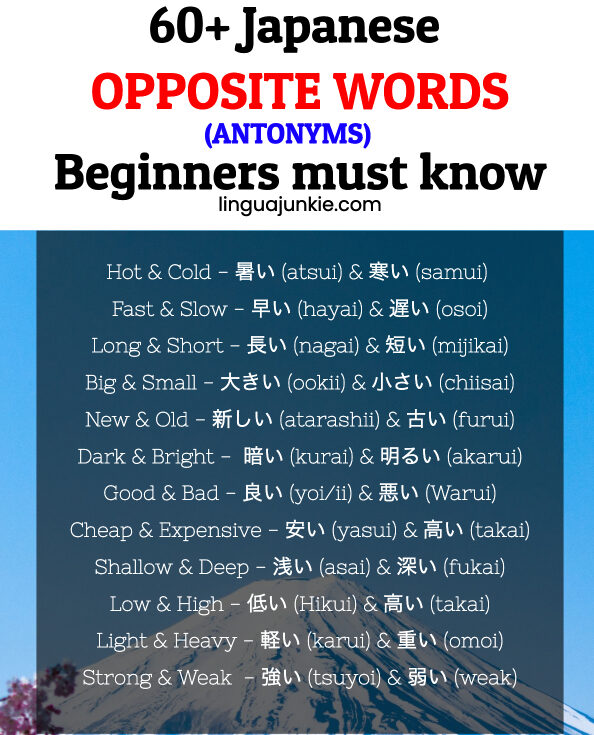
Antonyms are “opposite” words like… “fast and slow.”
And if you’re here, you’re wondering about Japanese antonyms….
Or, perhaps how to say hot and cold in Japanese?
Or young and old in Japanese?
Well, have no fear, little guy or gal. Lingujunkie (that’s me) is here to share 68+ nice Japanese antonyms with you. And this guide is broken up into 4 parts
- Adjectives
- Verbs
- Adverbs
- Direction Words
So, let’s take a look at some Japanese antonyms, eh?
Part 1: Japanese Antonyms Adjectives
First let’s look at some Japanese adjectives that are antonyms. Like hot and cold, new and old, and hairy and bald.
And there are a lot of adjectives!
- Hot & Cold – 暑い (atsui) & 寒い (samui) (weather only)
- Fast & Slow – 早い (hayai) & 遅い (osoi)
- Long & Short – 長い (nagai) & 短い (mijikai)
- Big & Small – 大きい (ookii) & 小さい (chiisai)
- New & Old – 新しい (atarashii) & 古い (furui)
- Dark & Bright – 暗い (kurai) & 明るい (akarui)
- Interesting & Boring – 面白い (omoshiroi) & つまらない (tsumaranai)
- Straight & Bent – 真っ直ぐな (massuguna) & 曲がった (magatta)
- Black & White – 黒い (kuroi) & 白い (shiroi)
- Smooth & Rough – なめらかな (namerakana) & 粗い (arai)
- Poor & Rich – 貧しい (mazushii) & 豊かな (yutakana)
- Tall Height & Short Height – なめらかな (namerakana) & 粗い (arai)
- Easy & Difficult – 簡単な (kantan na) & 難しい (muzukashii)
- Bitter & Sweet – 苦い (nigai) & 甘い (amai)
- Intelligent & Stupid – 頭がいい (atama ga ii) & 頭が悪い (atama ga warui)
- Correct & Wrong – 正しい (tadashii) & 間違った (machigatta)
- Quiet & Loud – 静かな (shizukana) & うるさい (urusai)
- Safe & Dangerous – 安全な (anzen na) & 危ない (abunai)
- Fat & Thin – 太っている (futotte iru) & 痩せている (yasete iru)
- Polite & Rude – 丁寧 (teinei) & 失礼 (shitsurei)
- Good & Bad – 良い (yoi/ii) & 悪い (Warui)
- Cheap & Expensive – 安い (yasui) & 高い (takai)
- Shallow & Deep – 浅い (asai) & 深い (fukai)
- Low & High – 低い (Hikui) & 高い (takai)
- Delicious & Awful (taste) – 美味しい (oishii) & まずい (mazui)
- Good (at something) & Bad – うまい (umai) & 下手 (nigate)
- Many & Few – 多い (ooi) & 少ない (sukunai)
- Light & Heavy – 軽い (karui) & 重い (omoi)
- Strong & Weak – 強い (tsuyoi) & 弱い (weak)
How many of these did you know?
Part 2: Verbs
Now, here are the verb Japanese antonyms like “stop and go.”
- To Go & To Return – 行く (iku) & 帰る (kaeru)
- To Sit & To Stand – 座る (suwaru) & 立つ (tatsu)
- To Receive & To Give – 貰う (morau) & あげる (ageru)
- To Wake Up & To Sleep – 起きる (okiru) & 寝る (neru)
- To Die & To Live – 死ぬ (shinu) & 生きる(ikiru)
- To Make & To Destroy – 作る (tsukuru) & 壊す(kowasu)
- To Buy & To Sell – 売る (uru) & 買う(kau)
- To Win & To Lose – 勝つ (katsu) & 負ける (makeru)
- To Laugh & To Cry – 笑う (warau) & 泣く(naku)
- To Push & To Pull – 押す (osu) & 引く (hiku)
- To Float & To Sink – 浮く (uku) & 沈む (shizumu)
- To Put On & To Take Off – 着る (kiru) & 脱ぐ(nugu)
- To Turn On & To Turn Off – つける (tsukeru) & 消す (kesu)
- To Teach & To Learn – 教える (oshieru) & 学ぶ (manabu)
- To Open & To Close – 開ける (akeru) & 閉じる (tojiru)
- To Show & To Hide – 見せる (miseru) & 隠す (kakusu)
- To Add & To Subtract – 足す (tasu) & 引く (hiku)
- To Stop & To go – 止まる (tomaru) & 進む (susumu)
- To Dig & To Bury - 掘る (horu) & 埋める (umeru)
- To Find & To Lose – 見つける (mitsukeru) & 無くす (nakusu)
Part 3: Adverbs
Then, we have antonyms that are Japanese adverbs, or words that modify verbs, adjectives, or other adverbs.
- Slowly & Quickly – ゆっくり (yukkuri) & 早く (hayaku)
- Tightly & Loosely – きつく (kitsuku) & ゆるく (yuruku)
- Loudly & Quietly – うるさく (urusaku) & 静かに (shizuka ni)
- Lightly & Heavily – かるく (karuku) & 重く (omoku)
- Forcefully & Gently – 強く (tsuyoku) & そっと (sotto)
- Joyfully & Reluctantly – 楽しく(tanoshiku) & しょうがなく(shouganaku)
- Cleanly & Dirtily – 綺麗に (kireini) & 汚く (kitanaku)
- Clearly & Confusingly – わかりやすく (wakariyasuku) & わかりにくく (wakarinikuku)
- Efficiently & Inefficiently – 効率的に (kouritsuteki ni) & 非効率的に (hikouritsuteki ni)
- Nervously & Confidently – 恐々と (kowagowa to) & 自信を持って (jishin o motte)
Part 4: Direction Words
And of course, directional words like “up and down” and “left and right.” These are very common and you’ll learn them within the first few chapters in most Japanese textbooks.
- Before & After – 前 (mae) & 後 (ato)
- Left & Right – 左 (hidari) & 右 (migi)
- Up & Down – 上 (ue) & 下 (shita)
- North & South – 北 (kita) & 南 (minami)
- East & West – 東 (higashi) & 西 (nishi)
- Front & Back – 前 (mae) & 後ろ (ushiro)
- Close & Far – 近く (chikaku) & 遠く (tooku)
- In & Out – 中 (naka) & 外 (soto)
- Entrance & Exit – 入口 (iriguchi) & 出口 (deguchi)
Hey! You’re Done!
Well, not really.
But I mean, done with this article.
You still have to learn these words. But, don’t worry, learning words – like Japanese antonyms – doesn’t have to require painful memorization. You just need to see these words enough times and they’ll get lodged in your brain. And that would naturally happen if you’re learning with a Japanese program, using a textbook, and are watching Japanese shows.
And obviously there are more Japanese antonyms out there.
So, let me know. Which am I missing? What else would you want to see here?
Leave me a comment.
- The Main Lingua Junkie
